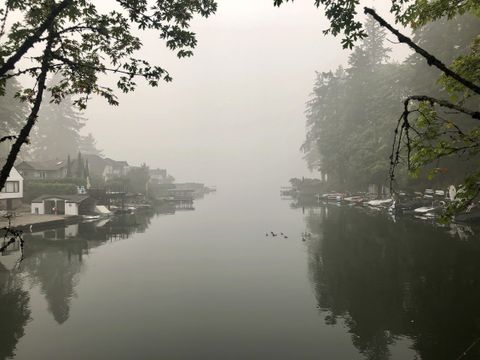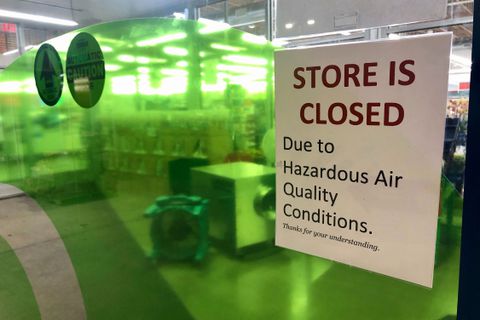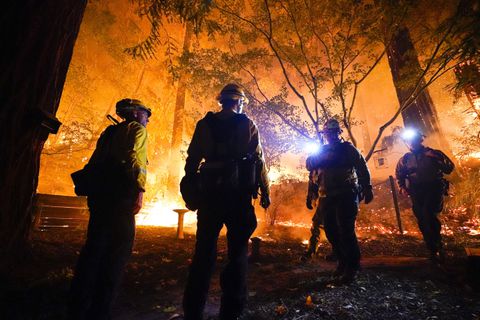‘The fire nearly trapped us’: Readers share stories from the wildfires raging across the West
William “Zac” Gable, 38, Berry Creek, Calif: On the night when the fire came through, we knew it was coming, but we had no idea how fast or how furious things would be. We spent most of that day at our fire station, informing concerned Berry Creek residents that, “Yes, the fire was coming, and yes, it would be a good idea to pack some belongings and leave the evacuation area.” Sometime around 5 p.m., we listened to a Cal Fire information briefing, which reported that the wind event would push the fire toward Berry Creek and we should expect the fire’s front to arrive late that night or early the next morning.
Around 7 p.m., we received a panicked call from one of our residents. He said he could see the fire from his front door. Thinking that he was merely overexcited, the volunteers at the station loaded up into our smallest engine and headed out to assist him in his evacuation. That was the last time we saw our station. The fire had arrived.
The flames reached from the ground to the treetops, more than 60 feet high. The fire roared like a jet engine and moved as fast as the wind, which gusted 30 to 40 mph. We later learned that the fire front was a wall more than a dozen miles wide. There was no fighting this onslaught. The fire nearly trapped us when it came raging across the road we were traveling down. When we escaped the storm, the top of our engine was in flames because our hoses had caught fire. After tossing our burning equipment off our truck, we went into full evacuation mode. We spent the rest of the night and following morning doing all we could to stay ahead of the flaming winds and get as many residents as possible out of danger. It was one of the most terrifying and destructive things I have ever seen.

A residential area smolders during the Bear Fire, part of the larger North Lightning Complex fire, in the Berry Creek area of unincorporated Butte County, Calif., on Sept. 14.

A door remains standing at a burned Berry Creek school during the Bear Fire in the Berry Creek area of unincorporated Butte County, Calif., on Sept. 14.

A burned firetruck is left inside the charred remains of Butte County Fire Station 61 during the Bear Fire in the Berry Creek area of unincorporated Butte County, Calif., on Sept. 14.
TOP: A residential area smolders during the Bear Fire, part of the larger North Lightning Complex fire, in the Berry Creek area of unincorporated Butte County, Calif., on Sept. 14. BOTTOM LEFT: A door remains standing at a burned Berry Creek school during the Bear Fire in the Berry Creek area of unincorporated Butte County, Calif., on Sept. 14. BOTTOM RIGHT: A burned firetruck is left inside the charred remains of Butte County Fire Station 61 during the Bear Fire in the Berry Creek area of unincorporated Butte County, Calif., on Sept. 14.
When the wind subsided and the flames began to relent, we returned to the heart of Berry Creek to investigate the damage. Words really cannot describe our emotions or the devastation we saw. All that could be seen in every direction were black sticks jutting out of white ash, speckled with piles of twisted metal and rubble that once were homes. As we explored the wasteland, it soon became clear that more than 90 percent of the town’s homes and structures had been completely destroyed by the fire, including our own volunteer fire station. Our station was nothing more than rubble, with the charred hulks of our other engine and water tender truck still parked where we had left them, inside what once was our engine bay. I am an Army veteran and I served in the Iraq War. What I saw in Berry Creek was far more devastating than anything I have ever seen before.
Despite it all, I am optimistic about the future. Our community is strong, the people are strong, and we are already planning and talking about how we are going to rebuild our town.
Julia Scheeres, 53, Albany, Calif.: I’ve held it together pretty well during these past five months of lockdown. As coronavirus deaths rise, as civil unrest roils the country, I’ve tried to maintain a safe space at home for my family. But the wildfires broke me.
Unwittingly, we witnessed their arrival. As our family sat in an isolated cove at the southern end of Lake Tahoe last month, we felt relaxed, happy. It was the most normal we’d felt in months. Then I noticed the thick haze forming at the north end of the 22-mile-long lake. We thought it was fog. Over the next hour, it rolled toward us, obscuring the casinos in Stateline, Nev., on the lake’s eastern side and billowing over the 9,000-foot peaks on the western side. And then we caught a whiff of camp smoke. “Not fog — smoke,” my husband said, alarmed. By the time we packed up our car, the world was sepia-toned. The smoke was worse the next day; we cut our vacation short and drove home.
But the smoke followed us there. We lug our two small air purifiers from room to room and Zoom to Zoom. We’re supposed to stay inside, to avoid inhaling dirty air, which is hard for Californians accustomed to using their backyards as extended living rooms. Although the fires are hundreds of miles away, a thick layer of ash coats the trampoline, and the smell of smoke penetrates our house.
Coronavirus, wildfires sparked by climate change, economic and political uncertainty — what’s next? How much longer can I bubble-wrap my kids’ lives, to promise them that if they just grit this out, things will go back to normal? What if normal never returns?
 A family of ducks swims on Oswego Lake, which is almost completely obscured by wildfire smoke, in Lake Oswego, Ore. on Sept. 14. (Gillian Flaccus/AP)
A family of ducks swims on Oswego Lake, which is almost completely obscured by wildfire smoke, in Lake Oswego, Ore. on Sept. 14. (Gillian Flaccus/AP) Vic Goodman, 71, Lake Oswego, Ore.: We had an uncontained fire 16 miles from Lake Oswego. For the first time in my memory, Lake Oswego residents were put on a Level 1 evacuation alert, which thankfully was lifted three days later as weather conditions started to change. So many in our county were not so lucky. The smoke was hellacious. The air quality remained in the “hazardous” category for a minimum of five days straight while the Portland metro area boasted the worst air quality of major cities across the globe. We were not leaving the house, and the furnace filter was nearly clogged by simply recirculating the air. To be clear, our story is nothing compared with whole towns being burned and the tens of thousands of people who have lost everything or had to evacuate in the middle of a pandemic. It is beyond heartbreaking.
 A sign at a Whole Foods in Lake Oswego, Ore., on Sept. 14. (Gillian Flaccus/AP)
A sign at a Whole Foods in Lake Oswego, Ore., on Sept. 14. (Gillian Flaccus/AP) Jessica Murray, 43, Eugene, Ore.: Where I live, we have at this moment some of the worst air quality in the world. Every five minutes, I check the air-quality app, then the weather app that has been predicting rain for the past few days. But the raindrop icons move further and further out. All of us living in this dirty bubble of smoke remain unsatisfied, frustrated, balancing on the edge of sanity.
The acrid smell of smoke has crawled into my house and makes everything smell of campfires and burning plastic. I have not gone outside in a week. I cannot even tolerate the smoke to water my vegetable garden. Instead, I’m sequestered in a corner of my bedroom. I haven’t been able to draw in a full breath since the wildfires began, and it feels like my brain is dying a slow death, suffocating on the smoke that has encapsulated my town.
 Firefighters make a stand in the backyard of a home in front of the advancing CZU August Lightning Complex Fire in Boulder Creek, Calif., on Aug. 21. (Marcio Jose Sanchez/AP)
Firefighters make a stand in the backyard of a home in front of the advancing CZU August Lightning Complex Fire in Boulder Creek, Calif., on Aug. 21. (Marcio Jose Sanchez/AP) Chris Finnie, 70, Boulder Creek, Calif.: Friends and neighbors lost their homes. I did not — except for the month I spent evacuated. I’ve lived here 25 years and have never had to evacuate before. So I only brought enough for a couple of days. Two pairs of shorts, two T-shirts, a nightgown and some undies. Cal Fire usually brings in planes, helicopters and personnel and limits the spread quickly. I suspect they know that if they allow it to spread in this rugged terrain, it would be almost impossible to fight. But that’s what happened. With fires all over the state, firefighters were spread too thin. The size of the fire near me quadrupled in 24 hours. By the time they brought in helicopters and planes, they couldn’t use them because the smoke was too thick. And so it raged on.
They are making progress in containing the fire, but spot fires are still cropping up. Those of us who still have homes didn’t have power for weeks because of damage to infrastructure and the inability of repair crews to get in to fix it. I just got back phone and Internet connections about 28 days after I evacuated. The local water system was decimated, and they’ve done temporary repairs while waiting for Federal Emergency Management Agency funds to do more permanent ones. My neighborhood is still under a “do not drink, do not boil order” five weeks after the fire started. We use bottled water for everything and shower at friends’ houses. I took my laundry to a laundromat about 10 miles away. But I slept in my own bed for the first time in exactly a month. I’ve donated clothes to one of the local churches that are handing them out to people who need them.
Read more:
Natalie Hanson: Terror is California’s new normal. How long can we hold out?
Eugene Robinson: The world is burning and drowning. We have to vote for the planet’s future.
Julie Parrish: Bad forest policies and political indifference kindled Oregon’s wildfires
Kathleen Parker: Earth is fighting for her life. We’re the pandemic.






